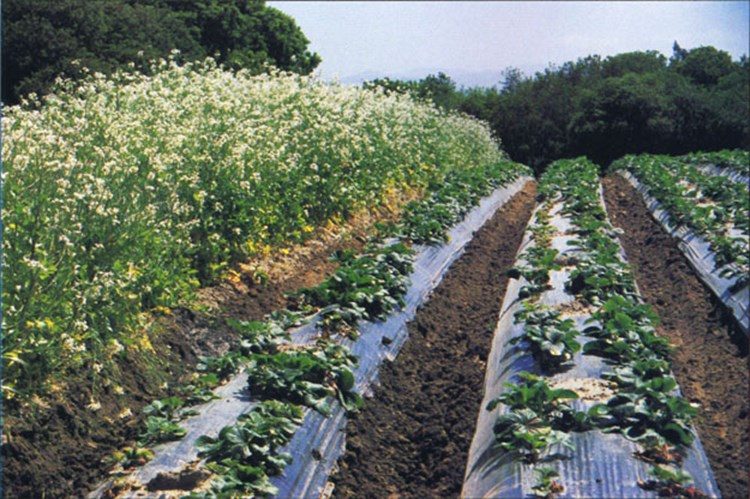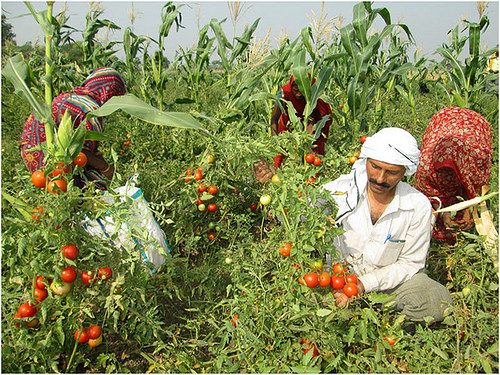Organic farming is an alternative agricultural system that began in the 20th century. It is aimed at making changes in farming methods. This is the method based on unused or minimal use of synthesized fertilizers and synthesized pesticides. This type of cultivation is being developed today by various organic agricultural organizations. Organic farming basically depends on the basic fertilizers such as gober manure, green manure and bone manure. It promotes against pests that prevent crop diseases and harm crops.

Nutrition has a strong ability to produce grounds. Organic farming is in the interest of the environment which is good for your health. Minerals such as zinc and iron are present in large quantities in food items prepared from organic farming. Both of these elements are essential for our health.
A research of the European Union on organic foods suggests that 40 percent more anty oxidants are found in organic farming products compared to generally found foods. Anty oxidants are elements that protect you from the particles that damage the body’s cells. Government has various schemes of Central Sector likeUnder the National Sustainable Agriculture Mission, the provision of financial assistance to farmers through State Governments to adopt organic farming in the country. The Mission of Yactual Development of Horticulture in IndiaIncludes National Food Safeguard Mission and Agriculture Development Scheme.
Currently certified organic farming in India has about 45 lakh hectares and the number is growing rapidly. Global organic market currently around 65 billion Americans $ Stands on and growing at a strong annual rate of more than $5 billion. Certified organic products are produced in India, including all varieties of food products namely basmati rice, lentils, honey, tea, spices, coffee, oilseeds, fruits, processed food, cereals, herbal medicines and their value added products. Also food fields are produced from organic cotton fibers, textiles, cosmetics, functional food products, body care products etc. Uttar Pradesh
Similarly, the rakba of cultivation in Rajasthan is less, but the farmers of this state are quite serious about cultivation. Different types of crops are being taken in Rajasthan even after opposite conditions. Now farmers have become quite aware of organic farming. As per the statistics of the Department of Agriculture, there are biological farming in the vicinity of the State, including Bamboowara, Zhalawad, Alwar, Sriganganagar. The State Government is also advancing farmers in this direction. Organic farming farmers are also being rewarded.
म.प्र. में सर्वप्रथम 2001-02 मेंं जैविक खेती का अन्दोलन चलाकर प्रत्येक जिले के प्रत्येक विकास खण्ड के एक गांव मे जैविक खेती प्रारम्भ कि गई और इन गांवों को ”जैविक गांव” का नाम दिया गया । इस प्रकार प्रथम वर्ष में कुल 313 ग्रामों में जैविक खेती की शुरूआत हुई। इसके बाद 2002-03 में द्वितीय वर्ष मे प्रत्येक जिले के प्रत्येक विकासखण्ड के दो-दो गांव, वर्ष 2003-04 में 2-2 गांव अर्थात 1565 ग्रामों मे जैविक खेती की गई। वर्ष 2006-07 में पुन: प्रत्येक विकासखण्ड में 5-5 गांव चयन किये गये। इस प्रकार प्रदेश के 3130 ग्रामों जैविक खेती का कार्यक्रम लिया जा रहा है। मई 2002 में राष्ट्रीय स्तर का कृषि विभाग के तत्वाधान में भोपाल में जैविक खेती पर सेमीनार आयोजित किया गया जिसमें राष्ट्रीय विशेषज्ञों एवं जैविक खेती करने वाले अनुभवी कृषकों द्वारा भाग लिया गया जिसमें जैविक खेती अपनाने हेतु प्रोत्साहित किया गया। प्रदेश के प्रत्येक जिले में जैविक खेती के प्रचार-प्रसार हेतु चलित झांकी, पोस्टर्स, बेनर्स, साहित्य, एकल नाटक, कठपुतली प्रदर्शन जैविक हाट एवं विशेषज्ञों द्वारा जैविक खेती पर उद्बोधन आदि के माध्यम से प्रचार-प्रसार किया जाकर कृषकों में जन जाग्रति फैलाई जा रही है।
Benefits of organic farming–
Benefits of Farmers
– Increases land production capacity.
– Increases the gaps in the sitch.
– Reduced dependence on chemical composting reduces cost.
– Increases productivity of crops.

Improvement in soil quality-
Soil quality is the foundation on which organic farming is based. Construction and maintenance of soil fertility of farming methods is tried. For this there are multiple crop growing, crop rotation, organic manure and pesticide and minimum tillage etc. methods. The original organic element in the soil is made of nourishing elements of natural plants, which is made of green manure, animal manure, compost and plant residue. There is information that the soil has low density, high water holding capacity, high microbial and high soil respiratory activity during organic farming. This indicates that organic farming provides greater nutrients to the crop from mychrobal activities
Crop yield and income-
नागपुर मे जैविक कपास का क्षेत्र परिक्षण से पता चलता है की रूपांतर की अवधि के दौरान कपास की उपज पारंपरिक तरीके, उर्वरक और कीटनाशक के इस्तेमाल और एकीकृत फसल प्रबंधन (50% प्रतिशत जैविक और अजैविक के उपयोग से) तुलना में कम थी परन्तु तीसरे वर्ष से कपास की पैदावार बढ़ने लगी. कपास की पैदावार खेती के चौथे वर्ष से, जैविक खेती से 898 पारंपरिक खेती से 623 और मिश्रित खेती के तरीके से 710 किलोग्राम प्रति हेक्टर होने लगी। सोयाबीन की पैदावार बाकि दो पद्धति की तुलना मे जैविक पद्धति से अधिकतम थी,देश के 1050 विभिन्न क्षेत्रो मे राष्ट्रिय परियोजना विकास और जैव उर्वरक के प्रयोग के तहत यह प्रमाणित किया गया की फसलो की पौधे रोपण मे 5 प्रतिशत वृद्धि हुई, फलो की 7 प्रतिशत वृद्धि हुई, गेहू और गन्ने की फसलो मे 10 प्रतिशत की वृद्धि, बाजरा और सब्जियों मे 10 प्रतिशत वृद्धि, रेशा और मसाले मे 11 प्रतिशत की वृद्धि, तिलहन और फुल मे 14 प्रतिशत की वृद्धि, तंबाकू मे 15 प्रतिशत की वृद्धि हुई।
Subtraction in number of pests-
The number of eggs, larvae and adults in organic farming is reduced according to the study of the central cotton research Nagpur, bearing on the insect of organic cotton. Bio-control methods such as Neem based insecticide is available in the country than traditional farming. Indigenous technical products such as Panchgavya (five products based on cow origin) which were tested in the University of Agricultural Sciences, Baglor According to this, the control of the vault disease in tomatoes is impressive. Pests like stem piercers, leaf modifiers, vorl meggots and BPH cause severe damage in yield. Biological-Kit
EnglishNuclear Benefits –
– Increases the water level of land.
– Reduces pollution through water in soil, foods and ground.
– The use of waste, in composting, reduces diseases.
Reduce crop production costs and increase income.
– Destroying the quality of organic product in the international market event.
Biological farming method gives equal or more production than the chemical farming method i. Organic farming is fully helpful in increasing soil fertility and productivity of farmers. The method of organic farming in rain-based areas is even more profitable. The cost of production is lower than cultivated by the biological method, as well as the farmers gain more income to the brothers and organic products in the international market event.

